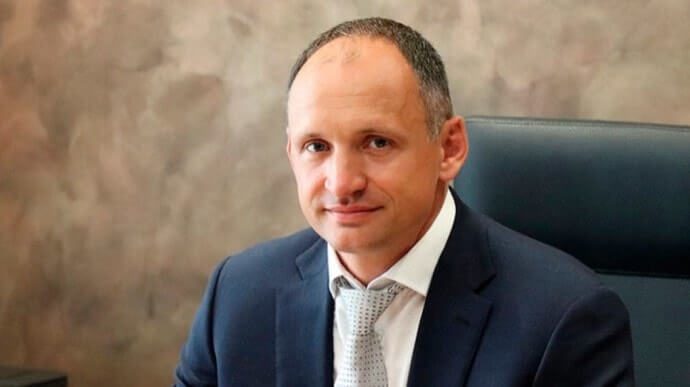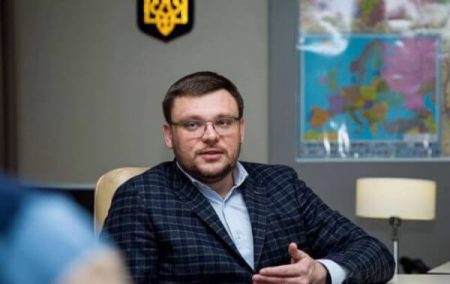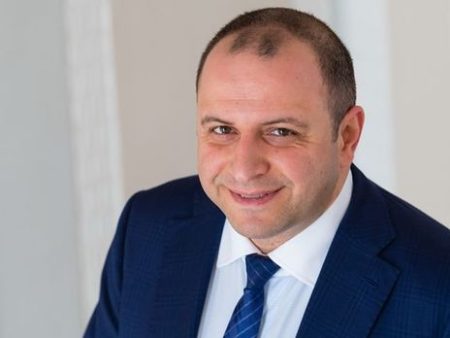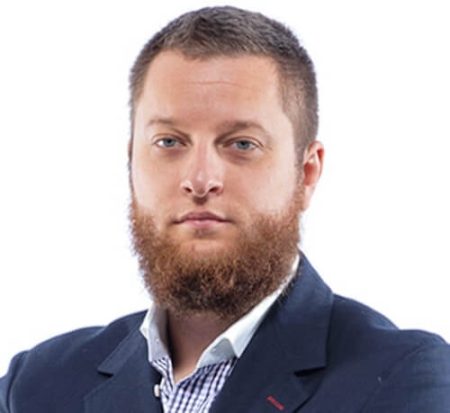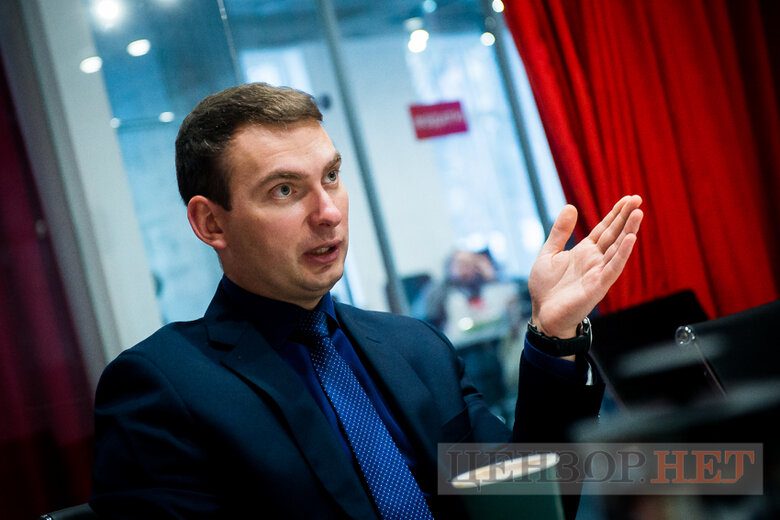
As deputy chairman of the OP, Tatarov took control of the BEB, Customs, and the State Bureau of Investigation. They cover up smuggling and corruption
Tatarov is in charge of the law enforcement system and managed to place his people in important positions in law enforcement agencies, especially in customs and in the Bureau of Economic Security.
Since the end of the year, a temporary investigative commission has been working in the Verkhovna Rada, looking into serious instances of corruption in law enforcement agencies, customs and the Bureau of Economic Security, which is supposed to uncover economic criminals.
BusinessCensor talked with the head of the VSK, a deputy of the Holos party, Yaroslav Zheleznyak, about the growth of corruption and smuggling during the war, and which is related to the deputy head of the President’s Office, Oleg Tatarov.
Tatarov plays a key role in the Ukrainian law enforcement system. He placed his people in important positions in all law enforcement agencies (except for NABU and SAPO): the National Police, the SBU, customs, the State Bureau of Investigation and the Bureau of Economic Security.
One of Tatarov’s associates is the recently appointed Deputy Prosecutor General Anton Voitenko.
Maxim Tsutskiridze, who is Tatarov’s godfather, works in the leadership of the National Police as the Deputy Head of the National Police.
The chairman of the SBI, Alexei Sukhachev, and the deputy head of the main investigative department of the SBI, Dmitry Mirkovets, are considered to be close to Tatarov.
Additionally, Tatarov influences the head of economic counterintelligence of the SBU, Artem Shilo. According to Bigus.infoover ten years in the special service, he amassed a fortune of $4 million.
Vadim Melnyk, the director of the Bureau of Economic Security, is also identified as being linked to Oleg Tatarov.Additionally, former friends and colleagues of Tatarov during his time at the Ministry of Internal Affairs were hired at the BEB, including Tatarov’s godfather, ex-prosecutor Vitaly Gagach, central office analyst Nikolai Chinchin, who once directly supervised Oleg Tatarov, and Alexander Tkachuk, who is responsible for detective work.
___
Who is Oleg Tatarov
Oleg Tatarov is a disgraced official from the governing bodies of the Ministry of Internal Affairs of the Yanukovych era, who during the Maidan told foreign media that the Maidanists shot themselves.
In 2005, he earned a master’s degree from the National Academy of Internal Affairs. In 2010, he graduated from Taras Shevchenko National University with a degree in Accounting and Audit. Then he graduated from the University of London and received a European lawyer’s license.
From 1999 to 2014, Tatarov served in the internal affairs bodies.
Since 2011, he has been deputy head of the Main Investigation Department of the Ministry of Internal Affairs. During this time, he was a member of various working groups to improve the legal regulation of the activities of pre-trial investigation bodies, the prosecutor’s office and the bar.
In 2014, after the escape of President Viktor Yanukovych, Tatarov was fired from the Ministry of Internal Affairs. However, the courts later ruled Tatarov’s dismissal as illegal.
Since 2014, Tatarov has been working as a managing partner at the Tatarov Farinnik Golovko Law Firm.
In this role, Tatarov represented the ex-deputy head of Viktor Yanukovych’s administration, Andrei Portnov, in court. In 2016, he served as a lawyer for the people’s deputy from the Opposition Platform for Life Vadim Novinsky, and he defended Valery Chernobuk, former head of the Court of Appeal of Crimea, who is suspected of treason. In 2014, he urged Crimean judges to obtain Russian citizenship and conduct legal proceedings according to Russian laws.
Tatarov also acted as a lawyer for Olesya Kuznetsova, the wife of the deceased Ivan Kuznetsov, who attacked activist Sergei Sternenko. In May 2019, Tatarov requested that the SBU investigator declare Sternenko suspected of premeditated murder and attempted murder of two people. This carries a potential sentence of up to life imprisonment.
Until 2017, Tatarov led the legal department of the Ukrbud corporation. NABU and SAPO are suspected of complicity in receiving a bribe in the form of a parking space in the Artyomovsky residential complex from the owner of Ukrstroy, Maxim Mikitas, to Konstantin Dubonos, Deputy Director of the State Research Forensic Center of the Ministry of Internal Affairs of Ukraine. However, after the intervention in the case by the former Prosecutor General of Ukraine, Irina Venediktova, Tatarov was cleared of the suspicion. The prosecutors who were supposed to bring charges to court were secretly replaced, and the case was transferred from NABU and SAPO to the SBU, believed to be a pre-trial investigation body more loyal to Tatarov due to close ties with the department's leadership.
Tatarov is also linked to certain members of the commission for the election of the head of the SAP, which obstructed the appointment of the head of the SAPO Oleksandr Klymenko, a former NABU detective known for investigating the case against Tatarov regarding the theft of housing for the National Guard during the construction of Ukrstroy.
On August 5, 2020, Volodymyr Zelenskyy appointed Tatarov as the Deputy Head of the Office of the President of Ukraine. This move sparked criticism in society. A few days later, Zelensky justified the appointment by saying that Tatarov appeared to be a professional and “it’s unfair to consider all the people who headed this or that link of power during the “Yanukovych era” to be considered the “old government.”
In the OP, Tatarov is responsible for the law enforcement system. He managed to place his people in key positions in law enforcement agencies, including customs and the Bureau of Economic Security.
___
– How did Oleg Tatarov, given his biography, end up in a fairly close circle of President Zelensky?
It’s hard to even imagine who started it. On the day it was appointedTatarov as Deputy Chairman of the Office of the President-BC) I was in the circle of many “Servants of the People”, some of them were on the Maidan or their children took part, for them it was a shock. They did not expect such a destination and rated it poorly. It is difficult to explain such purpose. If you read Tatarov’s biography, you will immediately understand that his appointment will be a reputational problem.
– Can we assume that Oleg Tatarov had strong connections in law enforcement agencies, and that's why they decided to appoint him to the OP?
– Have you ever heard of Tatarov before his appointment? I've been following this area for a long time and I have not heard of him. He was known from the Maidan. Tatarov was a lawyer for Portnov, Novinsky, Judge Chernobuk, and helped Mikitas. He definitely has connections, but I have never heard of this man's significant influence. I think his influence started to grow with his position in the Office of the President.
Yaroslav Zheleznyak
— In one of your interviews, you mentioned that if Tatarov was fired, it would have a big economic impact for Ukraine. They mentioned the amount of damage caused by his activities at the BEB at UAH 80 billion, and at customs at UAH 120 billion. Can you explain how you calculated these numbers?
— For instance, for customs, last year there was a plan to collect UAH 528 billion, but due to various factors, only UAH 300 billion were collected. Our committee, in which the majority of members are from the ruling party, unanimously voted half a year ago to recognize the work of customs as unsatisfactory. There is a corrupt anarchy. Demchenko does not actually manage anything except the Volyn customs, everything is managed by his deputy, Mr. Ruslan Cherkassky, who previously worked at the Donetsk and Energy customs under Yanukovych. He runs customs under Tatarov's supervision.
We are investigating several episodes of customs, some of which involve petty schemes such as fumigation in Odessa, when they take money to prevent worms in the grain, or deliberately delay the cargo to extort money. There are also systemic corruption flows. Our VSK has received anonymous messages regarding the head of customs being brought the size of the unlawful benefit that he should generate, and then deciding independently what methods to use to ensure this. Our VSK will check this information, and if confirmed, it will transfer the information to NABU, because the level of customs deputies falls under the accountability of this anti-corruption body.
— Could you tell us about the main cases at customs that are currently being considered by your VSK?
“Firstly, this is 'black' grain, which was either stolen or bought for black cash, or illegally grown at state enterprises, and it is exported by firms through the grain corridor. Since September, there has been a memorandum between the tax, customs and BEB. If you want to export grain, you must submit a preliminary customs declaration. Customs provides this data to the tax auditing firm. If it has no employees, land, warehouses, bank accounts, has paid zero taxes, has all the signs of fictitiousness, the tax office sends information to customs and BEB, which should arrest this grain.
There are around 600 suspicious businesses. Some of them are quietly exporting, without anyone trying to stop them. According to information from BEB and SBU, the decision to export finally depends on the corruption of customs officers.
When we asked customs officials why some similar companies are allowed to pass without customs checks while others are not, they couldn't explain. It's a simple, stupid, and rather basic scheme. Currently, Mrs. Victoria Dubovik is in charge at Odessa customs, and she's a close friend of Cherkassky.
What is the extent of the illicit gain from the grain?
I have different information from the documents obtained during searches. Some journalists mention a 1% amount of the export price. Sources interviewed by VSK suggest even more. Various numbers are mentioned: 40 cents for fumigation, 40 cents for non-obstruction of export, plus another 1% of the export price. Our law enforcement agencies should verify if these figures are accurate.
Have you analyzed the proportion of the so-called “black” grain in the exported volume?
Out of 3,000 customs declarations from such companies, about 600 were identified, with 118 at the start of our investigation. Some are in a status that's not clear. The final number is definitely higher.
Do major grain traders – multinational companies assist you in investigating illegal grain information?
They're really interested because these gray firms are taking up space on the ship and not paying taxes or returning foreign earnings. However, those involved in the schemes themselves leak information to each other like spiders in a jar. There's much more help from insiders in various law enforcement agencies.
I suggest discussing cigarette smuggling through the duty free scheme.
Duty free cigarettes are manufactured for sale in duty free shops. This area of customs is currently under Ruslan Cherkassky's authority. In Ukraine, a large amount of duty free cigarettes are produced, some of which go to Poland, Romania, and other countries, but also end up on the Ukrainian market, constituting a significant portion.
The discussion involves a cigarette manufacturer in Zhovti Vody, a rare case of schematosis. The “Schemes” project investigated him, and the proceedings are linked to Mr. Nikolai Martynenko from the “Popular Front”, who, due to a corruption scandal, resigned and is now under investigation by NABU.
In Zhovti Vody, the equipment has not yet been completely removed by law enforcement officers, indicating that it's not profitable for someone. Duty free cigarettes from Vinnikovskaya Tobacco Factory can also be found in kiosks. There's a connection between the recently dismissed Deputy Prosecutor General Alexei Simonenko, Tatarov’s associate, who went on vacation to Spain in the car of the owner of this tobacco factory, Grigory Kozlovsky.
The amount of illegal cigarettes being sold is now 22%, nearly three times higher than during Yanukovych's time. This is causing the country 20 billion hryvnia in damage.
Did the imported humanitarian aid really end up being sold in stores?
I believe that this could have actually happened at the start of a full-scale war. There's no doubt that goods were also smuggled through the forest. It's surprising to see well-known volunteers having issues at customs, while unheard-of companies are moving large amounts of aid. Customs officials have no questions despite this.
How do these corruption schemes connect?
When there are problems at customs, it leads to the growth of illegal financial activities. Illegal gambling and non-payment of wages by large networks are all part of the same financial system. Our gambling industry has avoided paying about UAH 9 billion in taxes, using tactics like withdrawing money under false pretenses.
Some of this money is then transferred to retail chain employees' cards, and then converted into the currency used to pay for illegal grain. I never thought that grain and gambling could be linked.
The same applies to smuggling. If we brought a thousand iPhones across a leaky customs, they can be sold for cash, leading to a large money laundering operation. Thus, inefficient customs contribute to the creation of ecosystems that result in even greater losses for us.
We assigned BEB to combat economic crimes, but they only compensated the state UAH 33 million while we spent about UAH 300 million on them last year. Conservative estimates suggest UAH 10 billion in losses from the gambling industry. Despite this, BEB has only initiated 34 criminal proceedings, with no one being accused or even suspected.
Although they have the authority, they are not being held accountable. The BEB project failed, partly due to a direct order to appoint Melnik as the head of BEB, creating an even worse agency than the tax police. Instead of one group, there are now three competing groups leaking information to each other.
As the head of VSK, one group exposes the schemes of the other, making our work much easier. Gmyrin's group, now based in Dubai, had been in control, but now Tatarov is in charge of the BEB. The BEB has spent a year exposing corrupt officials, and the only solution is to completely reboot it, as was done with NAPC and SAP.
While they have all the authority, it is their accountability. And there is no result. The BEB project failed, because at first there was a direct order from Tatarov to appoint Melnik as the head of the BEB. Melnik created an even worse body than the tax police. There was at least one grouping, but here three groups are quarreling among themselves, leaking information to each other.
To me, as to the head of the VSK, one group “knocks” on the other and gives out their schemes. This greatly simplifies the work, we will process all the materials. First there was a group of Gmyrin, already a resident of Dubai, and now, according to the sound recording from the VSK, which Yuri Butusov taught, Tatarov is sitting there, completely controlled by the BEB: Gagach as a deputy answers, Tkachuk – for detectives, Chinchin – for analytics. All these people are biographically connected with Tatarov. They took theirs. And so far, the BEB has been just exposing corrupt officials for the whole year. The only thing that can be done from BEB is to completely reboot it, as it used to be from NAPC and SAP.
– How can you influence the removal of Tatarov?
– My feeling shows a strange correlation, albeit a very pleasant one. Those persons who our public anti-corruption organizations acted on will very quickly fall into the US sanctions list. Tatarov made about the same mistakes as the OASK judge Pavto Volk. Their biographies are similar, they had cases from NABU, they successfully avoided it in court, they prevented the transparent election of the head of the SAP, they exerted illegal influence on law enforcement agencies, suspicions that this influence develops into improper monetary gain are justified. If you look at the history of Andrey Portnov, Alexander Dubinsky or Volk, you will find certain coincidences and I think that Tatarov has almost collected a full house from such things. Any power goes through stages of rejection, acceptance, reconciliation. It seems to me that the President will make personnel decisions in advance.
Olga Prokopishina, translation Skeleton.Info
